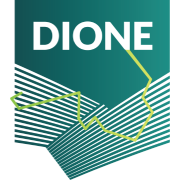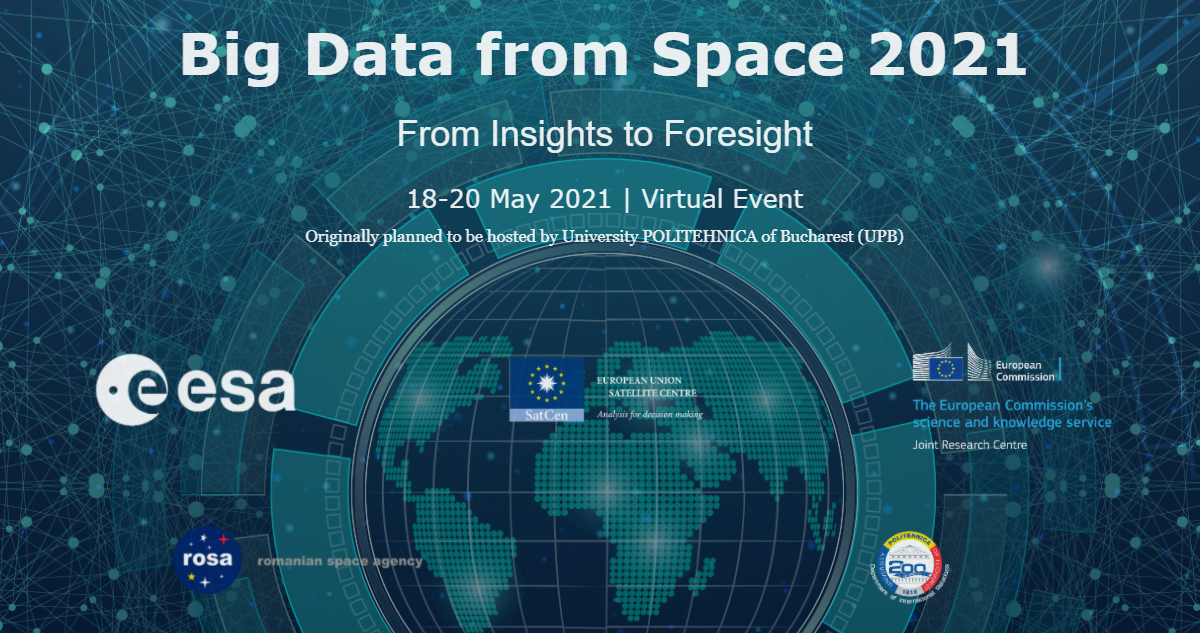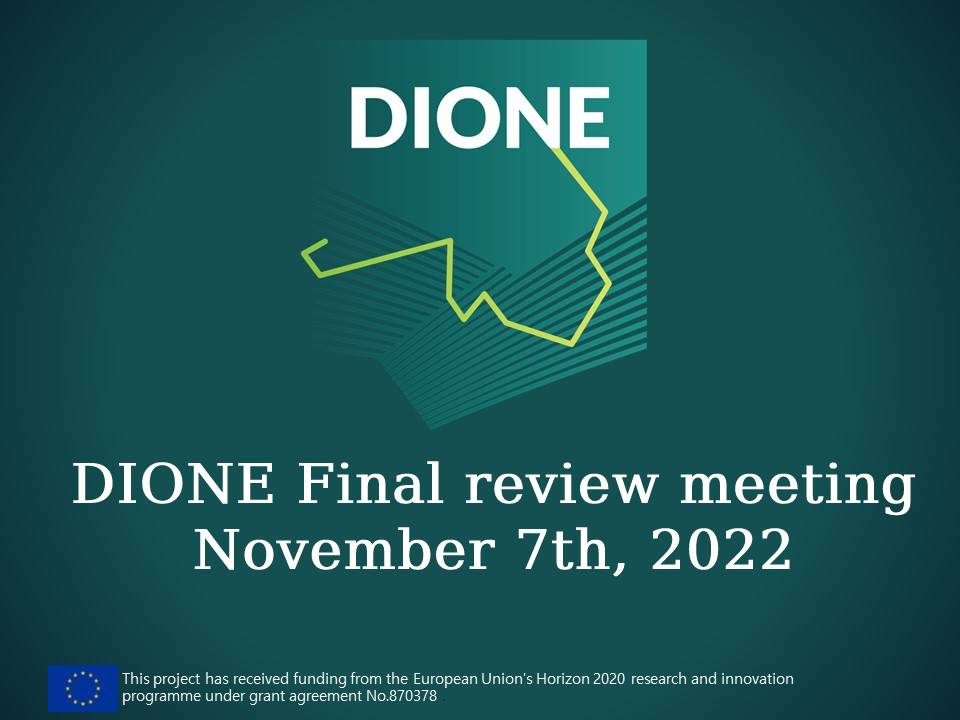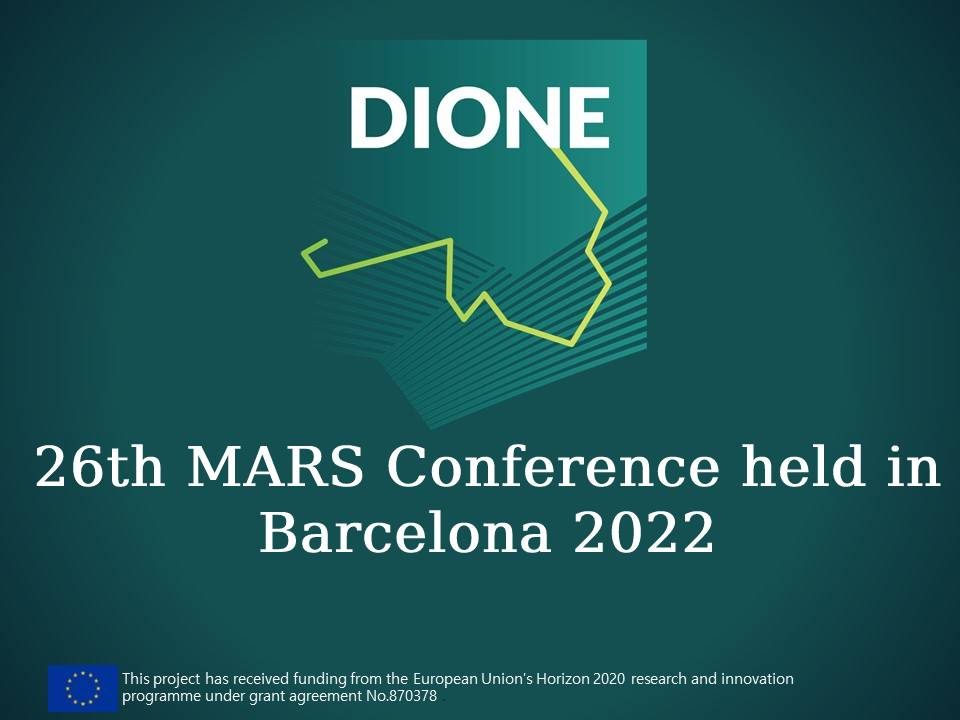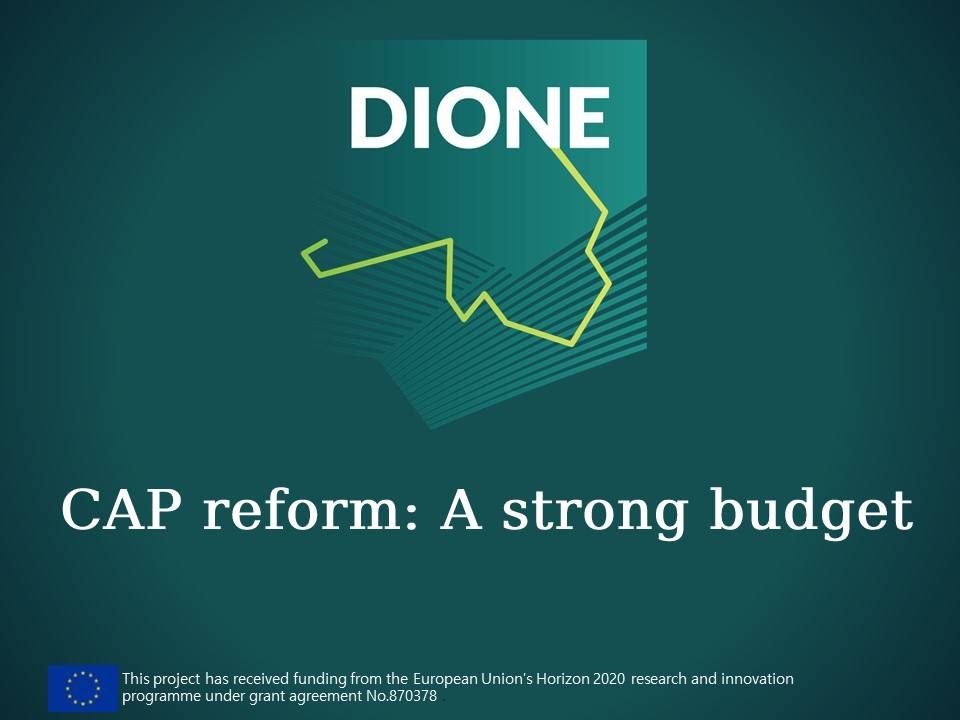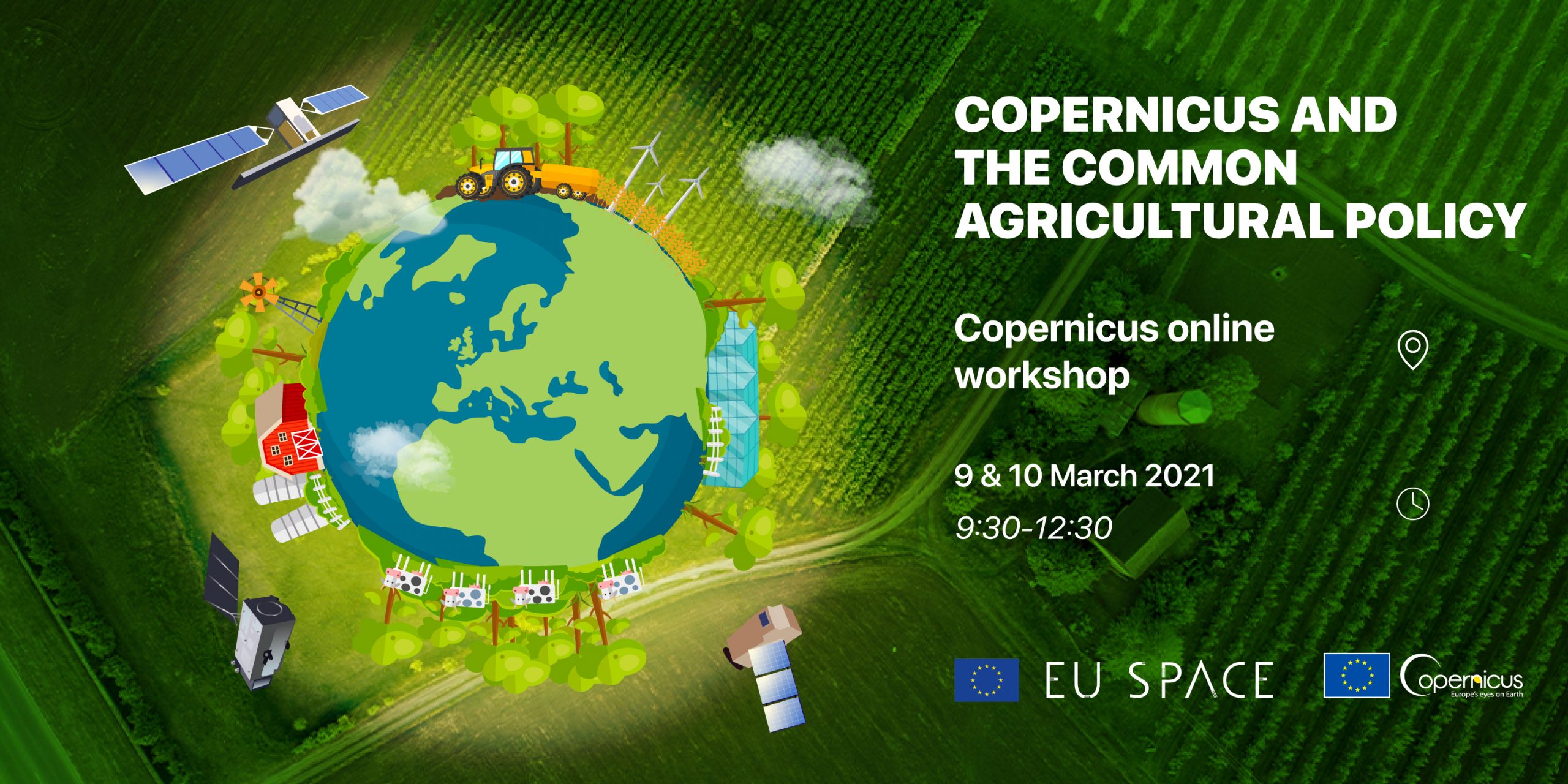
Copernicus and the Common Agricultural Policy – Workshop
February 18, 2021
Improving data management and information systems for the purpose of CAP evaluation
February 23, 2021DIONE invites you at the Big Data From Space 2021 Conference which will be held from 18th to 20th of May 2021!
The BiDS 2021 Conference is co-organised by the European Space Agency (ESA), the Joint Research Centre (JRC) of the European Commission, and the European Union Satellite Centre (SatCen). While BiDS 2021 has moved to an on-line conference, this edition benefits from the support of the Romanian Space Agency (ROSA).
The 2021 online edition of the Big Data from Space conference will emphasise not only on the insights that can be retrieved from Big Data from Space but also on the exploitation of these insights for foresight, that is our capacity of foreseeing.
This capacity is becoming increasingly important given the pace at which our World is changing.
This is exemplified and reflected by the EU Destination Earth (DestinE) initiative and the related ESA Digital Twin Earth, moving towards a predictive decision support capability for European environmental policies. Indeed, there is still a large gap to bridge between monitoring and understanding so that reliable scenarios of future evolution under different boundary conditions can be put forward.
As for all past editions, the 2021 edition is open to any research and innovation development in the field of Big Data from Space including technical aspects and applications.
The 2021 online edition of the Big Data from Space conference will emphasise not only on the insights that can be retrieved from Big Data from Space but also on the exploitation of these insights for foresight, that is our capacity of foreseeing.
This capacity is becoming increasingly important given the pace at which our World is changing.
This is exemplified and reflected by the EU Destination Earth (DestinE) initiative and the related ESA Digital Twin Earth, moving towards a predictive decision support capability for European environmental policies. Indeed, there is still a large gap to bridge between monitoring and understanding so that reliable scenarios of future evolution under different boundary conditions can be put forward.
As for all past editions, the 2021 edition is open to any research and innovation development in the field of Big Data from Space including technical aspects and applications.
Objectives
The 2021 edition of the Big Data from Space conference will emphasise not only on the insights that can be retrieved from Big Data from Space but also on the exploitation of these insights for foresight, that is our capacity of foreseeing. This capacity is becoming increasingly important given the pace at which our World is changing. This is exemplified and reflected by the EU Destination Earth (DestinE) initiative and the related ESA Digital Twin Earth, moving towards a predictive decision support capability for European environmental policies. Indeed, there is still a large gap to bridge between monitoring and understanding so that reliable scenarios of future evolution under different boundary conditions can be put forward. As for all past editions, the 2021 edition is open to any research and innovation development in the field of Big Data from Space including technical aspects and applications.
The main objectives of the BiDS 2021 Conference are:
Bring into scene new user needs and requirements related to the use of large amounts and varieties of data in different space domains such as Earth Observation (e.g. EU Copernicus programme),Space Science, Navigation and Telecommunications (e.g. EU Space programmes as Galileo and EU GovSatCom), mission operations and system engineering
Bring together major European actors in the fields of Space and data technologies, including research, industry, institutions, and users, to strengthen the communication and transfer of requirements, methods and technologies, and to reinforce an interdisciplinary approach
Explore and expand on the ever increasing relevance of Big Data in European and global environmental policy initiatives and programmes, and the corresponding increasing complexity of applications and use cases
Discover and foster breakthrough data science processing and analysis techniques to extract insights and generate foresight, showing use cases wherever possible to facilitate future user uptake
Focus on new paradigms of data science addressing the entire value chain, i.e., building of reference training sets, data processing to extract information, information analysis to gather knowledge, and knowledge transformation in foresight
Maximise the uptake and impact of solutions exploiting multi-source spatio-temporal data linked with other data sources
Advance the upscale of new solutions from R&I to operational use (e.g. for the security domain and informed policy making)
Foster inter-operability of platforms and services by promoting open standards, analysis ready data, and APIs
Promote inter-disciplinarity to respond to multi-sectorial challenges such a those put forward by the European Green Deal and the wide-ranging consequences of the COVID-19 pandemic
Promote cross-fertilisation with similar activities in other data intensive domains (e.g. high-energy physics, genomics, social media, internet of things, etc.).
The main objectives of the BiDS 2021 Conference are:
Bring into scene new user needs and requirements related to the use of large amounts and varieties of data in different space domains such as Earth Observation (e.g. EU Copernicus programme),Space Science, Navigation and Telecommunications (e.g. EU Space programmes as Galileo and EU GovSatCom), mission operations and system engineering
Bring together major European actors in the fields of Space and data technologies, including research, industry, institutions, and users, to strengthen the communication and transfer of requirements, methods and technologies, and to reinforce an interdisciplinary approach
Explore and expand on the ever increasing relevance of Big Data in European and global environmental policy initiatives and programmes, and the corresponding increasing complexity of applications and use cases
Discover and foster breakthrough data science processing and analysis techniques to extract insights and generate foresight, showing use cases wherever possible to facilitate future user uptake
Focus on new paradigms of data science addressing the entire value chain, i.e., building of reference training sets, data processing to extract information, information analysis to gather knowledge, and knowledge transformation in foresight
Maximise the uptake and impact of solutions exploiting multi-source spatio-temporal data linked with other data sources
Advance the upscale of new solutions from R&I to operational use (e.g. for the security domain and informed policy making)
Foster inter-operability of platforms and services by promoting open standards, analysis ready data, and APIs
Promote inter-disciplinarity to respond to multi-sectorial challenges such a those put forward by the European Green Deal and the wide-ranging consequences of the COVID-19 pandemic
Promote cross-fertilisation with similar activities in other data intensive domains (e.g. high-energy physics, genomics, social media, internet of things, etc.).
Themes
End-users market trends vision, needs and foreseen solutions involving Big Data coming from space sources and its potential integration with complementary data sources to enhance decision-making processes
From time-series to foresight: new paradigms for data assimilation, knowledge extraction and data valorisation, incorporating multiple-criteria decision analysis and with a special emphasis on prediction algorithms
AI integrated solutions exploiting multi-source data applicable to real scenarios, also developing models that are auditable, interpretable and able to cope with intrinsic bias
Disruptive technologies or technology spin-off from other domains into space to address critical aspects such as real-time analysis of big-data streams or the fusion of unstructured and structured data
Distributed and federated infrastructures for big data management, including related scalability and interoperability aspects, as well as data integrity, security and privacy
Platforms and analytical methods to integrate, access, process and visualize data from disparate sources and the added-value results to facilitate their interpretation
Cross-domain applications (e.g. impact of pandemics on supply chain, impact of climate change on safety and security of citizens, impact of new satellite constellations on daily mobility)
Documented training and validation advanced techniques to create documented training and validation datasets at large scale
Quantum computing for Big EO Data analysis
From time-series to foresight: new paradigms for data assimilation, knowledge extraction and data valorisation, incorporating multiple-criteria decision analysis and with a special emphasis on prediction algorithms
AI integrated solutions exploiting multi-source data applicable to real scenarios, also developing models that are auditable, interpretable and able to cope with intrinsic bias
Disruptive technologies or technology spin-off from other domains into space to address critical aspects such as real-time analysis of big-data streams or the fusion of unstructured and structured data
Distributed and federated infrastructures for big data management, including related scalability and interoperability aspects, as well as data integrity, security and privacy
Platforms and analytical methods to integrate, access, process and visualize data from disparate sources and the added-value results to facilitate their interpretation
Cross-domain applications (e.g. impact of pandemics on supply chain, impact of climate change on safety and security of citizens, impact of new satellite constellations on daily mobility)
Documented training and validation advanced techniques to create documented training and validation datasets at large scale
Quantum computing for Big EO Data analysis
Paper Submission
Paper submission is now open!
Authors are invited to submit a full 4-pages paper in pdf following the standard format templates provided below.
To submit a paper click here.
Deadline for the paper submission is 01 March 2021.
Submitted papers will be peer-reviewed by the Programme Committee. The evaluation will be based on appropriateness of the topic, quality, novelty, and clarity of exposition.
Notification of acceptance as oral presentation or poster presentation will be provided to authors by 02 April 2021.
Deadline for camera ready paper submission is 21 April 2021.
Authors are invited to submit a full 4-pages paper in pdf following the standard format templates provided below.
To submit a paper click here.
Deadline for the paper submission is 01 March 2021.
Submitted papers will be peer-reviewed by the Programme Committee. The evaluation will be based on appropriateness of the topic, quality, novelty, and clarity of exposition.
Notification of acceptance as oral presentation or poster presentation will be provided to authors by 02 April 2021.
Deadline for camera ready paper submission is 21 April 2021.

